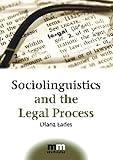Sociolinguistics and the legal process / [Book] / Diana Eades.
Material type: TextSeries: MM textbooksPublication details: Buffalo : Multilingual Matters, c2010.Description: xv, 303 pages : illuatrations ; 25 cmISBN:
TextSeries: MM textbooksPublication details: Buffalo : Multilingual Matters, c2010.Description: xv, 303 pages : illuatrations ; 25 cmISBN: - 9781847692542 (hardback : alk. paper)
- 9781847692535 (paperback : alk. paper)
- 340.14 22
- P40 .E13 2010
- 340.14
| Item type | Current library | Call number | Status | Date due | Barcode | Item holds |
|---|---|---|---|---|---|---|
 Books
Books
|
Junaid Zaidi Library, COMSATS University Islamabad | 340.14 EAD-S (Browse shelf(Opens below)) | Available | 53534 |
Browsing Junaid Zaidi Library, COMSATS University Islamabad shelves Close shelf browser (Hides shelf browser)
| No cover image available | No cover image available |

|

|

|

|

|
||
| 340.115 BEH Behavioral law and economics : volume II / | 340.115 BEH Behavioral law and economics : volume I / | 340.115 ORO-G Gender politics in transitional justice | 340.14 EAD-S Sociolinguistics and the legal process / | 340.14 HUT-L Language, meaning and the law | 340.14 MAT-C Comparative legal linguistics language of law, Latin and modern lingua Francas / | 340.14 RIL-C Common law legal English and grammar : a contextual approach / |
Includes bibliographical references (p. 273-294) and indexes.
Transcript conventions and abbreviations -- Using sociolinguistics to study the legal process -- Researching courtroom talk -- Focus on trials -- Second language speakers and interpreters -- Vulnerable witnesses -- Courtroom talk and societal power relations -- Police interviews -- Police interviews with members of minority groups -- Lawyer-client interactions -- Informal and alternative legal processes -- What (else) can sociolinguistics do? -- Legal glossary -- Sociolinguistic glossary.
Sociolinguistics and the Legal Process is an introduction to language, law and society for advanced undergraduate and postgraduate students. Its central focus is the exploration of what sociolinguistic research can tell us about how language works and doesn't work in the legal process. Written for readers who may not have prior knowledge of sociolinguistics or the law, the book has an accessible style combined with discussion questions and exercises as well as topics for assignments, term papers, theses and dissertations. A wide range of legal contexts are investigated, including courtroom hearings, police interviews, lawyer interviews as well as small claims courts, mediation, youth justice conferencing and indigenous courts. The final chapter looks at how sociolinguists can contribute to the legal process: as expert witnesses, through legal education, and through investigating the role of language in the perpetuation of inequality in and through the legal process.
All.


There are no comments on this title.